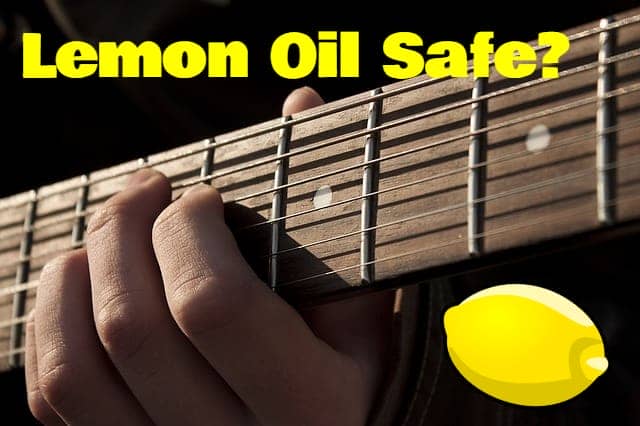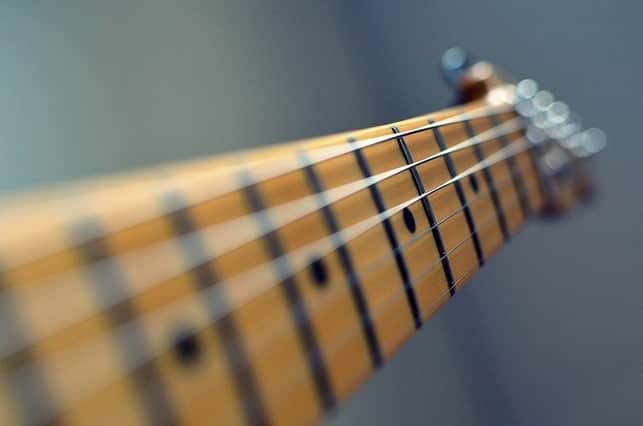
If you are like me and feel you create a deeper connection with your guitar when cleaning, polishing, and adding a fresh set of strings, then the cleaning process is actually like a bonding exercise.
With that said, guitar cleaning products containing ‘lemon oil’ have caused quite a debate online. Mostly with the guitar forums and YouTube community.
The discussion is whether lemon oil is safe for a dirty fretboard without harming the wood.
So after doing some research and finding out for myself, here is everything you need to know about lemon oil and guitar cleaning.
My Short Answer
Lemon oil cleaning products above 2% purity must be avoided for cleaning any guitar fretboard. 100% pure strength lemon oil is ‘highly acidic.’ When it makes contact with the fretboard, it can ‘dry out the wood’ and overtime ‘remove the adhesive’ holding the inlay markers to the wood.
What Lemon Oil Products Can I Use?
So wait, I cannot use any lemon oil products on my guitar? Not exactly!
100% Lemon oil is a great cleaning agent for removing grime, grease and sanitizing hard surfaces. However, it is far too acidic for a delicate surface such as the wood on your guitar neck.
Guitar companies know this, that is why most guitar lemon oil cleaning products contain a purity of 0.5-1% and nothing above.
So DO NOT use 100% Lemon oil products, only products below 1% or with ‘lemon-scented’ minerals.
The guitar products I recommend are ‘Dunlop Fretboard 65’ and ‘D’Addario Planet Waves Lemon Oil’ fretboard cleaners for great results!
A tip is to not buy and use any lemon oil-based guitar cleaning product that does not state the purity and the ingredients on the bottle. Simply if it doesn’t state then it is not safe, simple as that!
You need to know how much is in there otherwise, how do you know how much? Or the number of other harmful chemicals exposed to your fretboard?
Some products include natural mineral oils that are ‘lemon scented’ which can be misinterpreted as lemon oil just for you to be aware of.
Mineral oils are good because they do not penetrate the wood and are not intense enough to cause any damage to your precious fretboard.
So Remember! DO NOT use 100% Lemon oil products, only products below 1% or with ‘lemon-scented mineral.
Lemon Oil Safe On a Maple Fretboard?

Although it may be tempting to use a more aggressive cleaner on a maple fretboard, is a lighter wood that reveals more dirt and grime than rosewood and ebony fretboards.
The truth is with maple, you will need more care and attention than other woods.
For this reason, I would avoid using any lemon oil-based product on any maple fretboard, even the ‘guitar-based lemon oil products‘ I just mentioned above.
The reason is that maple fretboards include a “clear coat” finish meaning they are the most delicate compared to the darker rosewood and ebony. Therefore maple fretboards are the most at risk to any lemon oil-based products.
This is especially important for older vintage guitars that have an ‘unfinished neck’ that lacks a ‘laminated’ or ‘lacquer’ finish, unlike newer guitars.
Even lacquer finishes maple fretboards on newer guitars can be dulled over time with high purity cleaning products.
How to Clean a Maple Fretboard
The best thing would be to use for maple fingerboards would be a damp microfiber cloth with regular warm water to remove dirt, grime, and build-up and avoid any cleaners just to be sure.
Another thing to avoid is cleaning products that contain ‘silicone’ which is found in most household cleaners. If you have an older guitar with a worn maple neck, any cracks known as hairline cracks can essentially get under and stain the wood.
Rosewood and ebony woods are darker and also are absent of a glossy or satin finish.
These types of woods are also more porous so retain a lot of dirt and grime which means they will need a deeper clean. Although it does not look like it due to its darker appearance.
Guitar cleaning products with lemon oil are recommended and safe for these types of fretboards for removing the deep grease and grime and let the wood breathe.
Side note: 100% lemon oil is not good for people with skin allergies and can cause sinus irritation and is known to be carcinogenic.
Products to Avoid Cleaning Fretboards
- Lighter fluid – Lighter fluid contains ‘naptha’ which is a heavy solvent.
- These chemicals are far too corrosive and risk causing a reaction with the wood over time. Lighter fluid is also a respiratory health hazard to inhale for long periods of time.
- Lacquer thinner – This is also a heavy chemical that can dull a lacquer finish fretboard over time which should be avoided.
- Furniture polish – A guitar is not antique furniture, this polish can be too intense for delicate woods on a guitar.
- Cleaners with silicone – As discussed, this can stain the wood over the time with fingerboards that have hairline cracks.
- Bleach – Too intense and cause a reaction with the adhesive over time.
- All purpose cleaners – Not designed for delicate woods and contain heavy chemicals.
Do I Need Guitar Specific Cleaning Products?
This is a subjective question depending on whatever guitarist you ask but my short answer is no! I’m not saying guitar cleaning products do not work because they do.
The reality is you do not need to buy all the different guitar cleaning products out there. You can great some fantastic results by using regular household items. As a guitarist, you are marketed products that are not essential such as…
- Fretboard cleaners
- String cleaners
- Guitar body cleaners
- Hardware cleaners
- Conditioning products
This is especially true with beginners who want to get their guitars looking clean and feeling smooth but would assume that these products are a ‘must-have.’ As good as these products are they are just ‘optional extras.’
The reason is that you can clean a guitar with just a damp microfiber cloth/rag with warm water with a touch of vinegar and a dry rag to clean afterwards.
Obviously, a touch of TLC is required to take a grubby guitar to a cleaner and faster playing guitar without needing expensive guitar products.
$10 on a tiny bottle of fretboard oil some would say lacks value for money when you could use other alternatives.
However, these products will last a long time because you roughly clean a guitar once every 1-3 months. With these products, you only need a few drops on a clean rag so they are
I would suggest a guitar-specific fretboard oil to clean and condition the wood which creates a barrier by protecting the wood for future grime, sweat, and marks.
Speaking of guitar cleaning, I have a great post on how to polish your guitar using car wax with fantastic results!
Related Questions
What is the best cloth material for cleaning a guitar?
A microfiber cloth is the best material in my opinion. The reason is that it is the softest and will not scratch or damage the surface of your guitar. It also holds a nice amount of moisture from any liquid you add to it and has the benefit of leaving the least amount of blemishes on the surface of your guitar.
